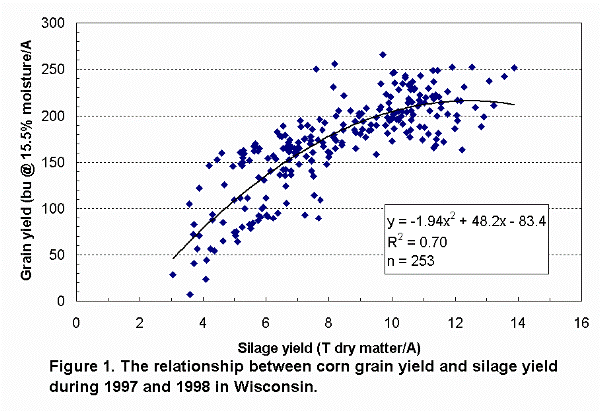
December, 2000
Field Crops 28.5-28
The Relationship Between Corn Grain and Silage Yield
Joe Lauer, Corn Agronomist
The relationship between corn grain yield and silage yield is important for determining
silage value (i.e. Loan Deficiency Payments). The current method for calculating
this relationship first appeared in 1972. Much progress has been made in breeding
adapted high yielding hybrids that are more resistant to biotic and abiotic stresses.
To describe the relationship between grain and silage yield, data were used where
plots had been split with half of the plot harvested for silage yield and the other
half harvested later for grain yield. Treatments applied to these plots included
various plant density, planting date and row spacing factors. Numerous locations,
hybrids and yield levels were obtained over the 1997 and 1998 growing seasons (n
= 253).
The relationship between grain and silage yield for current hybrids is described
in Figure 1. Grain equivalents at two silage moistures are shown. Current hybrids
produce grain yield equivalents greater than that of 1972 levels, by 1.0 to 2.0
bushels of grain per ton of silage at 65% moisture.
|
Table 1. Approximate bushels of grain contained in a ton of corn silage during 1997
and 1998.
|
|
|
Silage at 65% moisture
|
Silage at 0% moisture
|
|
Grain yield
|
Silage yield
|
Grain equivalent per Ton of silage
|
Silage yield
|
Grain equivalent per Ton of silage
|
|
Bu/A
|
T/A
|
Bu/T
|
T/A
|
Bu/T
|
|
25
|
7.1
|
3.5
|
2.5
|
10.0
|
|
50
|
9.0
|
5.5
|
3.2
|
15.8
|
|
75
|
11.1
|
6.8
|
3.9
|
19.2
|
|
100
|
13.4
|
7.5
|
4.7
|
21.3
|
|
125
|
15.9
|
7.9
|
5.6
|
22.4
|
|
150
|
18.7
|
8.0
|
6.6
|
22.8
|
|
175
|
22.2
|
7.9
|
7.8
|
22.4
|
